13 Best Herbal Teas For Dry Skin
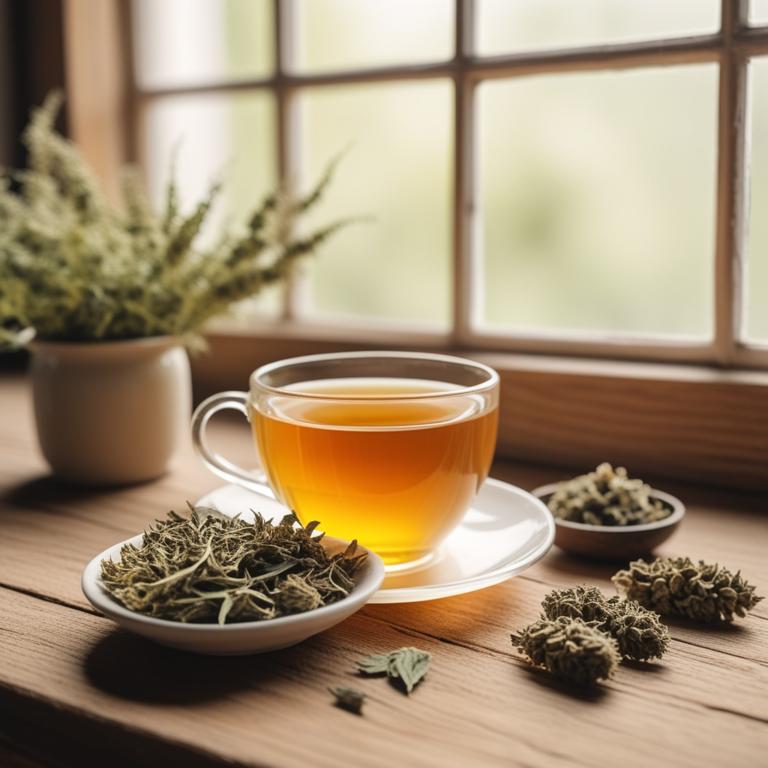
Herbal teas for dry skin are a type of natural remedy that utilizes the medicinal properties of various herbs to soothe, moisturize, and protect dry skin.
These teas offer numerous benefits, including reducing inflammation, promoting hydration, and providing antioxidant properties to combat free radicals that can exacerbate dryness.
Examples of herbal teas that can be used to treat dry skin include peppermint tea, which cools and calms the skin; chamomile tea, which soothes and relaxes dry, irritated skin; calendula tea, which promotes skin regeneration and hydration; ginger tea, which reduces inflammation and promotes blood flow to dry areas; and lavender tea, which calms and moisturizes dry, sensitive skin.
By incorporating these herbal teas into one's skincare routine, individuals can experience improved skin health and a reduction in dry skin symptoms.
According to "Frontiers in pharmacology", teas for dry skin may benefit from the bioactive extracts of traditional medicinal plants, such as those containing polyphenols and flavonoids found in extracts like Indigofera argentea, which have been shown to have skin rejuvenating properties and improve skin elasticity and moisture.
Below there's a list of the 13 best herbal teas for dry skin.
- 1. Aloe barbadensis teas
- 2. Chamomilla recutita teas
- 3. Lavandula angustifolia teas
- 4. Camellia sinensis teas
- 5. Urtica dioica teas
- 6. Calendula officinalis teas
- 7. Glycyrrhiza glabra teas
- 8. Melissa officinalis teas
- 9. Symphytum officinale teas
- 10. Thymus vulgaris teas
- 11. Equisetum arvense teas
- 12. Hypericum perforatum teas
- 13. Echinacea purpurea teas
Also you may be interested in...
TODAY'S FREE BOUNDLE
Herb Drying Checklist + Herbal Tea Shopping List + Medicinal Herbs Flashcards
Enter you best email address below to receive this bundle (3 product valued $19.95) for FREE + exclusive access to The Aphotecary Letter.
$19.95 -> $0.00
1. Aloe barbadensis teas

Aloe barbadensis teas have been traditionally used to treat dry skin ailments due to their soothing and moisturizing properties.
The anti-inflammatory and antioxidant properties of aloe vera, present in these teas, help to reduce inflammation and promote skin hydration, thereby alleviating dry skin symptoms.
The bioactive constituents, such as vitamins A, C, and E, as well as aloin and aloe-emodin, present in aloe vera, contribute to its therapeutic effects in treating dry skin.
Regular consumption of aloe barbadensis teas has been found to provide relief from dry skin, promoting healthy skin texture and appearance.
2. Chamomilla recutita teas
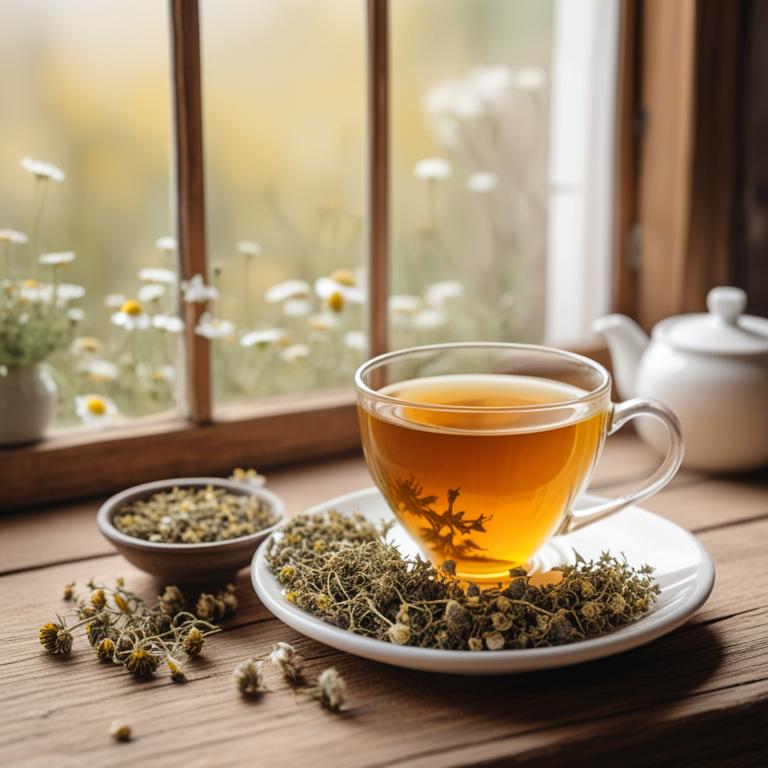
Chamomilla recutita teas, made from the flowers of the chamomile plant, have been used to treat dry skin ailments due to their anti-inflammatory and soothing properties.
The herbal preparation helps to treat dry skin by reducing redness and irritation, promoting relaxation and calmness, and improving skin hydration.
The bioactive constituents of Chamomilla recutita teas, such as apigenin and luteolin, possess antioxidant and anti-inflammatory properties that contribute to their skin-soothing effects.
Regular consumption of Chamomilla recutita teas has been found to provide benefits such as improved skin elasticity, reduced itchiness, and enhanced skin barrier function, making it a popular natural remedy for dry skin ailments.
Related Study
According to "Journal of ethnopharmacology", Chamomilla recutita teas for dry skin may not be directly mentioned in the study, however, the study does mention that the aqueous extract of Matricaria recutita L. (which is another name for Chamomilla recutita) demonstrated the ability to stimulate keratinocyte growth, indicating its potential benefits for skin health.
3. Lavandula angustifolia teas

Lavandula angustifolia teas have been traditionally used to treat dry skin ailments due to their anti-inflammatory and antioxidant properties, which help to soothe and calm irritated skin.
The bioactive constituents present in these teas, including linalool and linalyl acetate, possess potent moisturizing and protective effects that help to lock in moisture and reduce dryness.
The regular consumption of Lavandula angustifolia teas has been shown to improve skin hydration, reduce inflammation, and promote overall skin health, making it an effective remedy for dry skin ailments.
The benefits of using Lavandula angustifolia teas to treat dry skin include improved skin elasticity, reduced itching and irritation, and a more even and healthy skin tone.
4. Camellia sinensis teas
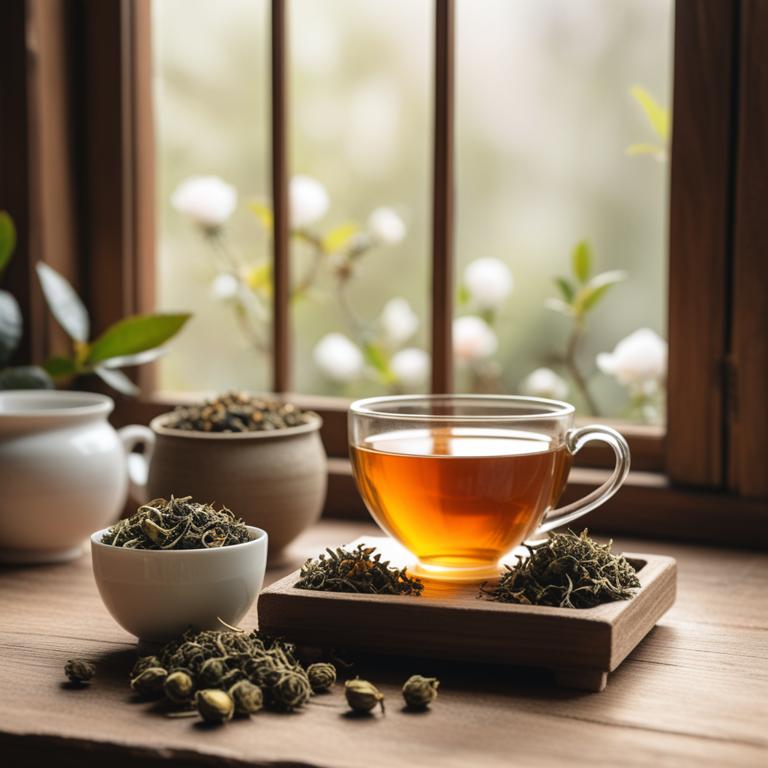
Camellia sinensis teas, a traditional herbal preparation, have been used to treat dry skin ailments due to their moisturizing and antioxidant properties.
The anti-inflammatory compounds present in Camellia sinensis, such as theaflavins and thearubigins, help to soothe and calm irritated skin, reducing redness and inflammation.
The high levels of vitamin C and E in Camellia sinensis teas also contribute to their ability to improve skin hydration and elasticity, promoting a more even and healthy skin tone.
Regular consumption of Camellia sinensis teas has been shown to provide long-term benefits in treating dry skin, including improved skin texture and reduced risk of skin infections.
5. Urtica dioica teas

Urtica dioica teas have been traditionally used to treat dry skin ailments, such as eczema and atopic dermatitis, due to their anti-inflammatory and antioxidant properties.
The herbal preparation helps to treat this ailment by soothing and calming irritated skin, reducing redness and itching, and promoting wound healing.
Urtica dioica teas contain bioactive constituents like histamine, flavonoids, and alkaloids, which contribute to their therapeutic effects by modulating the immune system and reducing inflammation.
The benefits of using Urtica dioica teas to treat dry skin ailments include reduced symptoms, improved skin health, and a decrease in the need for conventional medications, making it a popular natural remedy for skin conditions.
6. Calendula officinalis teas

Calendula officinalis teas have been traditionally used to treat dry skin ailments due to their anti-inflammatory and antimicrobial properties.
The flavonoids, triterpenoids, and carotenoids present in Calendula officinalis teas help to soothe and protect the skin, reducing redness and irritation associated with dry skin.
The bioactive constituents, including calendulin, triterpene saponins, and carotenoids, in Calendula officinalis teas promote wound healing and tissue regeneration, making it an effective remedy for dry skin conditions.
Regular consumption of Calendula officinalis teas has been shown to improve skin hydration, reduce dryness, and promote overall skin health, making it a beneficial herbal preparation for treating dry skin ailments.
Related Study
According to "Forschende Komplementarmedizin", Calendula officinalis teas for dry skin may be of value due to its potential efficacy in selected dermatological indications, although more studies are needed to prove its effects and clarify its mechanisms of action.
7. Glycyrrhiza glabra teas

Glycyrrhiza glabra teas, a traditional herbal remedy, have been used to treat dry skin ailments due to their moisturizing and anti-inflammatory properties.
The herbal preparation helps to treat dry skin by hydrating the skin, reducing inflammation, and restoring the skin's natural barrier function.
This is attributed to the presence of bioactive constituents such as glycyrrhizin, a triterpenoid saponin, and flavonoids, which possess antioxidant and anti-inflammatory activities.
The benefits of using Glycyrrhiza glabra teas to treat dry skin include improved skin hydration, reduced itching and irritation, and a decrease in skin dryness and flakiness.
8. Melissa officinalis teas

Melissa officinalis teas, also known as lemon balm tea, have been traditionally used to treat dry skin ailments due to their soothing and moisturizing properties.
The tea's anti-inflammatory and antimicrobial properties help to reduce redness and irritation, promoting healthy skin and preventing further dryness.
The bioactive constituents, including rosmarinic acid and citral, play a crucial role in calming and hydrating the skin, thereby alleviating dry skin symptoms.
Regular consumption of Melissa officinalis tea has been shown to provide numerous benefits, including improved skin elasticity, reduced dryness, and enhanced overall skin health.
Related Study
According to "Molecules (Basel, Switzerland)", Melissa officinalis teas for dry skin may be beneficial due to the aqueous extract's ability to enhance skin hydration, decrease erythema, and reduce transepidermal water loss levels.
9. Symphytum officinale teas
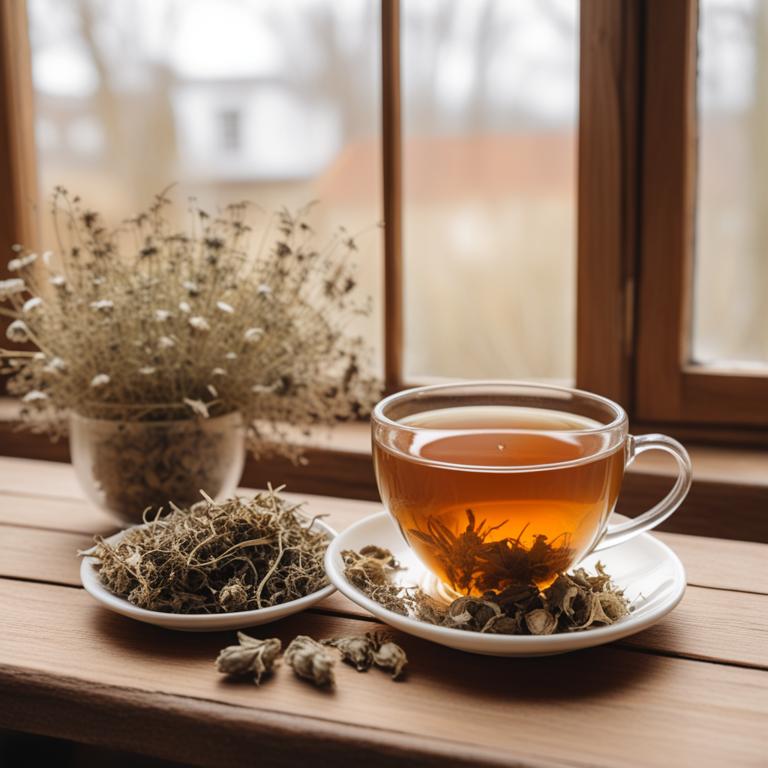
Symphytum officinale teas have been traditionally used to treat dry skin ailments, such as eczema and dermatitis, due to their anti-inflammatory and soothing properties.
The bioactive constituents of this herbal preparation, including allantoin, rosmarinic acid, and flavonoids, help to reduce inflammation, promote skin regeneration, and improve skin hydration.
By providing a protective barrier on the skin's surface and promoting collagen synthesis, Symphytum officinale teas help to treat dry skin ailments by reducing redness, itching, and scaling.
The benefits of this herbal preparation include reduced inflammation, improved skin health, and enhanced wound healing, making it a popular natural remedy for dry skin conditions.
10. Thymus vulgaris teas

Thymus vulgaris teas, also known as thyme tea, have been traditionally used to treat dry skin ailments due to their anti-inflammatory and antiseptic properties.
The bioactive constituents, including thymol and carvacrol, help to soothe and calm irritated skin, reducing redness and inflammation.
Thymus vulgaris teas work by promoting skin hydration and protecting the skin from environmental stressors, ultimately leading to improved skin health and reduced dryness.
Regular consumption of thymus vulgaris teas may also help to stimulate collagen production, further benefiting the skin and promoting a more radiant complexion.
Related Study
According to the study in the Journal of ethnopharmacology, Thymus vulgaris teas are used for dry skin, as it was reported by the informants in the ethnobotanical study in a Catalan district of the eastern Pyrenees.
11. Equisetum arvense teas
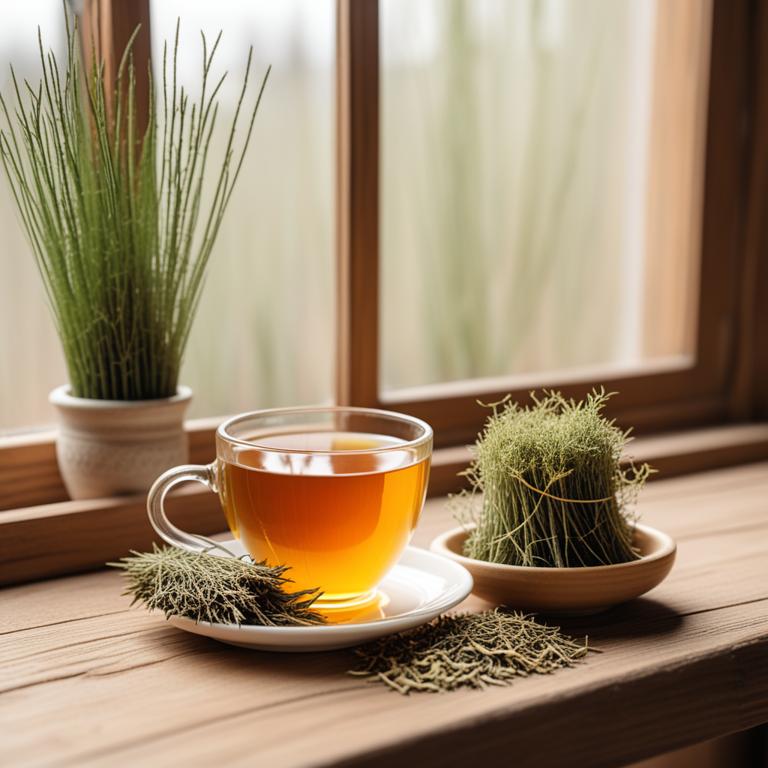
Equisetum arvense teas, also known as horsetail tea, have been traditionally used to treat dry skin ailments due to its anti-inflammatory and moisturizing properties.
This herbal preparation helps to treat dry skin by providing essential nutrients, such as silica, and antioxidants that help to soothe and hydrate the skin.
The bioactive constituents of Equisetum arvense, including flavonoids, saponins, and caffeic acid, contribute to its therapeutic effects, which include reducing inflammation and promoting skin elasticity.
The benefits of using Equisetum arvense teas to treat dry skin ailments include improved skin hydration, reduced inflammation, and enhanced skin elasticity, making it a natural and effective remedy for this common condition.
12. Hypericum perforatum teas

Hypericum perforatum teas, also known as St. John's Wort, have been traditionally used to treat dry skin ailments such as eczema and dermatitis due to their anti-inflammatory and antimicrobial properties.
The bioactive constituents, including hyperforin and hypericin, help to soothe and calm irritated skin, reducing inflammation and promoting wound healing.
By reducing inflammation and promoting skin regeneration, Hypericum perforatum teas can help to alleviate symptoms of dry skin conditions, such as itching, redness, and dryness.
The benefits of using Hypericum perforatum teas to treat dry skin ailments include improved skin health, reduced risk of infection, and a natural and non-invasive approach to managing symptoms.
Related Study
According to "Frontiers in pharmacology", Hypericum perforatum teas for dry skin may be beneficial due to the traditional use of Hypericum perforatum in treating skin problems such as eczema and dry skin in the villages of Mount Pelion, Greece.
13. Echinacea purpurea teas

Echinacea purpurea teas have been traditionally used to treat dry skin ailments such as eczema and dermatitis due to their anti-inflammatory and antimicrobial properties.
The bioactive constituents present in these teas, including alkylamides, glycosides, and phenolic acids, help to soothe and calm irritated skin, reducing redness and inflammation.
The flavonoids present in Echinacea purpurea teas also exhibit antioxidant properties, which help to protect the skin from damage caused by free radicals and promote wound healing.
By incorporating Echinacea purpurea teas into your skincare routine, you can enjoy the benefits of reduced skin irritation, improved skin hydration, and a more even skin tone.